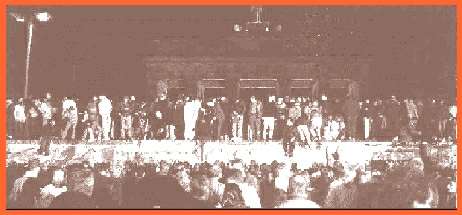6.5 The Re-Unification of Germany
Soon after the Second World War, the allies (Britain, France, U.S.A. and USSR) wanted fragmented disarmed Germany. So they divided her. Germany lost her territories to Poland (1945). There were some differences between the allies and their co-operation broke down. The USSR blockaded Western Berlin in 1948-49. In 1948, the western zones of Germany were merged economically, after which the Federal Republic of Germany was formed in the Soviet zone. The German Democratic Republic was proclaimed in 1949. In comparison with the Federal Republic, the Democratic Republic suffered. In 1953, there was an uprising against the repressive communist rule. There was an acute shortage of food and other things. However, in 1955, West Germany gained sovereignty and became a member of the Western alliance. West Germany attracted Eastern Europe in the economic and cultural areas in the late 1980s. The main reasons of the problems of GDR surfaced in the 1980s.
There were public demonstrations by the New Forum Opposition Movement in favor of reform. A new leader was appointed. The Berlin wall was opened once again in November 1989. But demonstrations for more radical change continued. A new non-communist government was elected and a new Prime Minister appointed. This included members of the opposition group. Elections were held in East Germany during March 1990. The German Chancellor proposed the monetary union of the two countries when the economy in East Germany collapsed. There was a call for German Re-unification. During October 1990, the re-unification took place. In December 1990, elections were held in Germany. After the Re-unification, Germany has become a great economic power in Europe.

Exhibit 6.3
People across either sides of the broken Berlin Wall reach out to each other (1989)
6.5a The German Economy
Even before the unification, Germany was economically very strong. Its share in the E.U.’s GDP was 28%. Even in trade, it holds a very good position. After the dollar, the Deutschemark is likely to remain the world’s second most important reserve currency until the Euro currency comes into existence.
6.0 - Introduction
6.1 North Atlantic Treaty Organization
6.2 The Collapse of Communism in Russia
6.3 Decolonization
6.4 European Monetary Union
6.5 The Re-Unification of Germany
6.6 Points to Remember